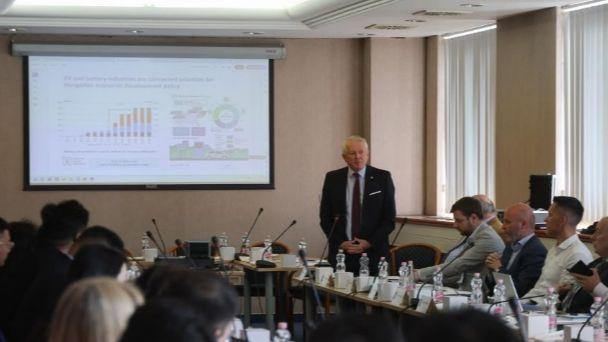Peter Kaderjak (C, rear), managing director of the Hungarian Battery Association, speaks during the Hungary Battery Recycling Cooperation Workshop in Budapest, Hungary, on Nov. 5, 2025. Officials and experts from Hungary and China attending the workshop here on Wednesday agreed that there are vast opportunities for cooperation in battery recycling and new energy for the two countries. (Photo by Attila Volgyi/Xinhua)
BUDAPEST, Nov. 5 (Xinhua) -- Officials and experts from Hungary and China attending a battery recycling workshop here on Wednesday agreed that there are vast opportunities for cooperation in battery recycling and new energy for the two countries.
Hungarian officials also said the country is working to build a full-cycle battery ecosystem and welcomes Chinese technology and investment.
At the Hungary Battery Recycling Cooperation Workshop, co-organized by the Hungarian Battery Association (HUBA) and the Sino-European New Energy Research Joint Laboratory, policymakers, industry representatives and researchers discussed lithium-battery recycling, extended producer responsibility (EPR), and circular-economy policies under the European Union's (EU) new Battery Regulation.
Peter Kaderjak, managing director of HUBA, said Hungary's battery capacity has grown from zero to 87 GWh in seven years, attracting 20 billion euros in foreign investment, mainly from South Korea, China and Europe. The country's capacity is projected to reach 250 GWh by 2030, he said, calling for stronger recycling and environmental transparency while inviting Chinese firms to join HUBA's research and recycling initiatives.
State Secretary for Circular Economy and Climate Policy Csaba Gondola said Hungary aims for a balanced green and digital transition. The country now leads Europe in solar expansion, reaching 8.2 GW, but the rapid growth in batteries and solar panels has created new e-waste challenges. Hungary's EPR and deposit return systems, introduced in 2023, are key to tackling these issues and opening new business opportunities.
Adam Nagy, deputy state secretary for industrial affairs at the Ministry for National Economy, said Hungary plans to develop a complete battery ecosystem, from production to recycling, by deepening cooperation with major Asian manufacturers, including those from China.
Aleksandar Dzombic, chairman of NT Recycling, said the newly launched joint laboratory reflects growing Sino-European collaboration and will focus on battery recycling, carbon data integration, and the EU Battery Passport system.
Zhao Dongchang, chief expert at the China Automotive Technology and Research Center, presented China's automotive carbon-footprint management system, highlighting global cooperation with European partners on carbon standard alignment as "of great significance."
Aleksandar Dzombic (C), chairman of NT Recycling, speaks during the Hungary Battery Recycling Cooperation Workshop in Budapest, Hungary, on Nov. 5, 2025. Officials and experts from Hungary and China attending the workshop here on Wednesday agreed that there are vast opportunities for cooperation in battery recycling and new energy for the two countries. (Photo by Attila Volgyi/Xinhua)
This photo taken on Nov. 5, 2025 shows the scene of the Hungary Battery Recycling Cooperation Workshop in Budapest, Hungary. Officials and experts from Hungary and China attending the workshop here on Wednesday agreed that there are vast opportunities for cooperation in battery recycling and new energy for the two countries. (Photo by Attila Volgyi/Xinhua)




 A single purchase
A single purchase









